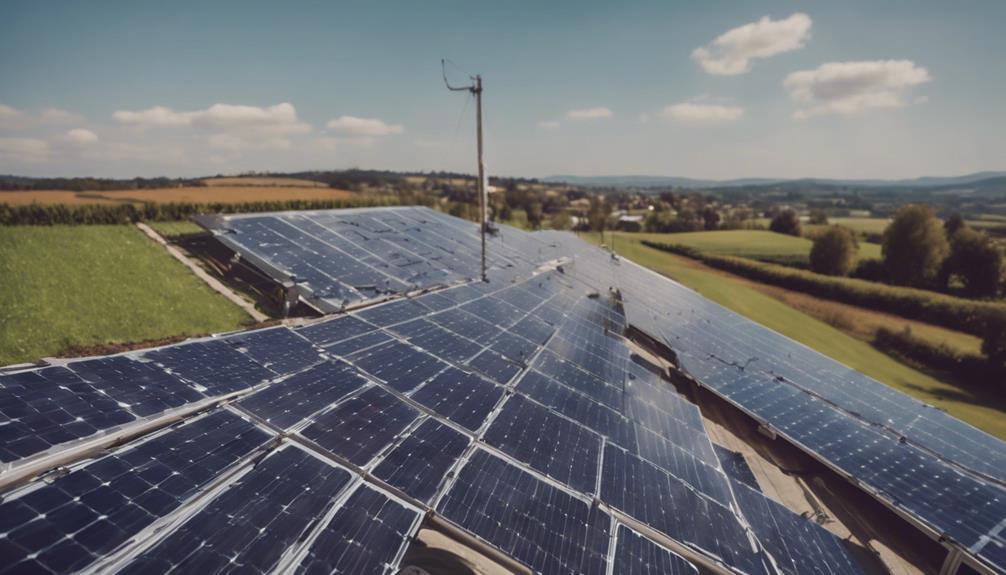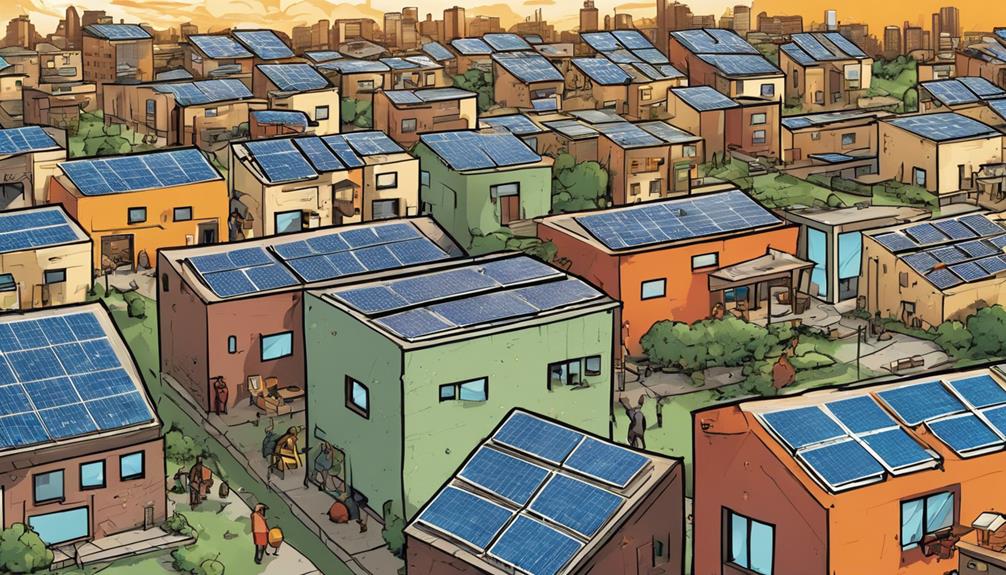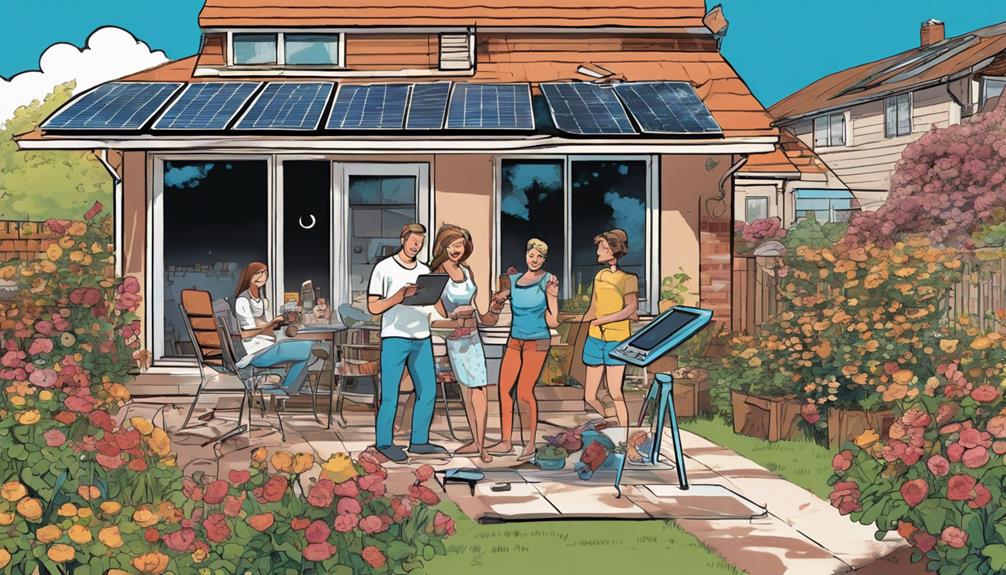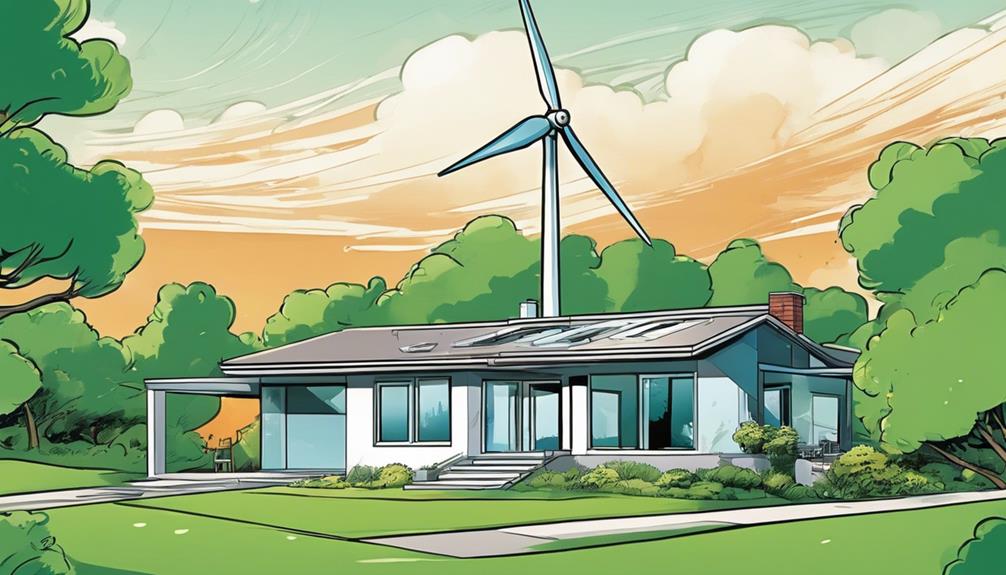You'll find solar energy is a renewable resource with long-term financial benefits, reducing electricity bills and maintenance costs. However, it can be intermittent and costly to install initially. Consider its positive impact on sustainability and communities, offering greenhouse gas reductions and the ability to sell excess energy back. Solar energy powers various sectors, boosts economic growth, and advances in technology are improving efficiency. Discover more detailed insights into the pros, cons, and efficiency of solar energy. Furthermore, solar energy is a renewable energy source that can provide energy security and independence for individuals and communities. Despite the initial investment, the long-term benefits of solar energy make it a viable and sustainable option for meeting energy needs. As technology continues to advance, the efficiency of solar panels and systems will only continue to improve, making it an even more attractive choice for environmentally conscious consumers and businesses.
Key Takeaways
- Solar energy is a renewable resource with long-term financial benefits.
- Solar panels reduce electricity bills and require low maintenance.
- Solar power generation is intermittent, but advancements improve efficiency.
- High initial installation costs are a barrier, but incentives like net metering help.
- Solar energy promotes sustainable practices, reduces greenhouse gas emissions.
Advantages of Solar Energy
With its numerous benefits and positive impact on both the environment and your wallet, solar energy presents a compelling case for consideration. Solar energy, derived from the sun, is a renewable resource that has existed for billions of years, offering significant advantages.
Solar panels, a common method of harnessing solar energy, have various applications such as electricity generation, water distillation, and even powering space systems. One of the key advantages of solar energy is its ability to reduce electricity bills by lowering energy costs and potentially allowing you to earn from surplus energy produced.
Additionally, solar panels require low maintenance, with minimal cleaning needs and long warranties, making them a cost-effective option for energy production. Businesses can benefit from year-round efficiency and significant cost reductions, promoting energy independence and sustainability.
Embracing solar energy not only helps the environment but also provides long-term financial benefits for you.
Disadvantages of Solar Energy

Solar energy presents challenges, including intermittent generation and high initial installation costs. The intermittent nature of solar power, dependent on sunlight availability, can lead to fluctuations in energy production, especially on cloudy days. This variability poses a challenge for maintaining a consistent energy supply.
Besides, the high initial installation costs can be a barrier for individuals or businesses looking to adopt solar energy systems. Energy storage also presents challenges, particularly for off-grid systems that rely on costly battery solutions to store excess energy for use when sunlight isn't available.
Additionally, the land use impact of solar farms raises environmental concerns, as these installations can disrupt ecosystems and habitats. Solar energy's weather-dependent nature further complicates its reliability, as efficiency decreases on overcast or rainy days. These factors contribute to the disadvantages of solar energy, highlighting the need for continued innovation in the field.
Sustainability and Community Benefits

Embracing solar energy brings sustainable practices and community benefits to the forefront of energy consumption. Solar panels, with a lifespan of 25 to 30 years, provide a long-term sustainable energy solution.
By harnessing solar power, you contribute to a cleaner environment and reduce greenhouse gas emissions, fostering a more eco-friendly future. Net metering further enhances the advantages of solar energy, allowing you to sell excess electricity back to utility companies and benefit both yourself and your community.
Communities also reap the rewards of reduced reliance on fossil fuels, shifting towards cleaner and more sustainable energy sources like solar power. This change not only promotes sustainability but also encourages a more environmentally conscious approach to energy consumption, benefiting society as a whole.
Diverse Applications and Impact

You'll discover that solar energy isn't just for powering homes; it has a diverse range of applications from satellites to off-grid regions. This versatility not only impacts energy costs positively but also provides sustainable solutions in areas with limited access to traditional power sources.
The ability to generate income through excess electricity production and benefit from incentive programs and net metering further showcase the impact of solar energy in various sectors.
Solar Energy Versatility
With its diverse applications and impact, solar energy demonstrates remarkable flexibility in powering various sectors and regions. Solar energy flexibility is seen in providing sustainable energy solutions in remote areas where traditional power sources may be limited. It powers off-grid regions, homes, appliances, satellites, and even boats.
Solar panels play a significant role in offsetting rising electricity prices by generating power on-site. Additionally, incentive programs and tax credits help reduce the upfront costs of solar installations, making them more accessible to a broader population. Net metering further enhances the benefits of solar energy by allowing consumers to sell excess power back to utility companies, not only reducing their own energy bills but also creating income opportunities.
This flexibility in applications and impact makes solar energy a vital player in the shift towards cleaner and more sustainable energy sources.
Impact on Energy Costs
Solar energy's impact on energy costs is significant and multi-faceted. By harnessing solar power, you can reduce your electricity bill and offset rising energy costs.
Solar energy offers financial benefits through incentive programs, tax credits, and the opportunity to sell excess electricity back to utility companies. This not only helps you save money but also contributes to a cleaner environment by reducing dependence on fossil fuels.
The versatility of solar energy is evident in its ability to power various applications like homes, appliances, satellites, boats, and off-grid regions. Regardless of the climate, solar energy remains a reliable and efficient solution for your energy needs.
Embracing solar power not only benefits your wallet but also supports sustainability and environmental conservation. Make the switch to solar energy today and start reaping the rewards of lower energy costs and a greener future.
Off-Grid Solutions
Off-grid solar solutions power a range of diverse applications in remote areas without traditional electricity access. These solar systems are essential for off-grid locations such as cabins, boats, RVs, and remote villages where connecting to traditional power grids isn't feasible.
By utilizing off-grid solar solutions, these areas can enjoy reliable power without the need for a connection to the main electricity grid. Off-grid solar systems incorporate batteries to store excess energy generated during sunny periods for use when sunlight is scarce, ensuring a continuous power supply.
Not only do these systems provide sustainable power sources, but they also promote energy independence and environmental sustainability in regions lacking reliable electricity infrastructure. Embracing off-grid solar solutions offers a practical way to meet the electricity needs of remote communities while reducing dependence on fossil fuels and advancing towards a greener future.
Solar Energy Technology

For harnessing solar energy effectively, understanding solar energy technology is essential. Solar panels, equipped with photovoltaic cells, are the cornerstone of solar energy technology, converting sunlight into electricity. These panels can be strategically installed on rooftops or ground-mounted to capture sunlight efficiently.
Solar inverters play a pivotal role by converting the direct current (DC) generated by solar panels into alternating current (AC) for use in homes and businesses. Additionally, solar trackers are employed to adjust the angle of solar panels, maximizing sunlight exposure throughout the day.
Advancements in solar energy technology are continuously improving efficiency, durability, and cost-effectiveness. These enhancements are making solar power an increasingly attractive option for renewable energy. As technology progresses, solar panels are becoming more efficient at converting sunlight into electricity, while also becoming more durable to withstand various weather conditions.
The cost-effectiveness of solar energy systems is also improving, making them a viable long-term investment for both residential and commercial applications.
Economic Aspects of Solar Energy

Long-term financial benefits can be realized through the economic aspects of harnessing solar energy. By tapping into solar power, you can enjoy cost savings over time by reducing your electricity bills.
Additionally, installing solar panels can increase your property value, offering a lucrative return on investment for homeowners. The Smart Export Guarantee (SEG) presents an opportunity to earn money by selling surplus solar energy back to the grid.
Businesses can also benefit from solar energy by significantly cutting costs and decreasing reliance on traditional grid electricity. This not only leads to financial savings but also contributes to economic growth through investments in renewable energy sources.
The solar industry itself creates job opportunities, further boosting economic development. Embracing solar energy not only secures your financial future but also helps drive sustainable economic progress.
Frequently Asked Questions
What Are the Pros and Cons of Solar Energy?
You've asked about the pros and cons of solar energy. It offers cost savings and environmental benefits but can be weather-dependent, requiring initial high installation costs. Land use for solar farms and efficiency on cloudy days are considerations.
What Is the Biggest Drawback of Solar Panels?
Struggling with cloudy days or nighttime? The biggest drawback of solar panels is their reliance on sunlight, making energy production less efficient when it's gloomy or dark. Storage options are pricey, affecting overall effectiveness.
Why Is Solar Energy Not Efficient?
Solar energy isn't as efficient due to various factors like sunlight intensity, panel positioning, shading, and temperature changes. Inverter inefficiencies, energy conversions, and wiring losses in PV systems also contribute to reduced efficiency.
What Are 5 Advantages of Solar Energy?
Solar energy offers you five key advantages: sustainability for over 5 billion years, reduced electricity bills, diverse applications like electricity generation and heating, low maintenance costs, and long panel warranties ensuring reliable energy production.
How Does Solar Energy Compare to Wind Energy in Terms of Efficiency and Benefits?
When comparing the advantages of solar wind energy, both have their own benefits. Solar energy is efficient in sunny areas, while wind energy is ideal in windy locations. Solar energy is clean and low-maintenance, while wind energy can generate power even at night. Each has its own advantages depending on the location and environment.
Conclusion
To sum up, solar energy offers a bright future for sustainable energy solutions.
With its numerous advantages, such as cost savings and environmental benefits, it's clear that solar power is a key player in the fight against climate change.
So, don't be left in the dark – harness the power of the sun and shine a light on a cleaner, greener future for all.










